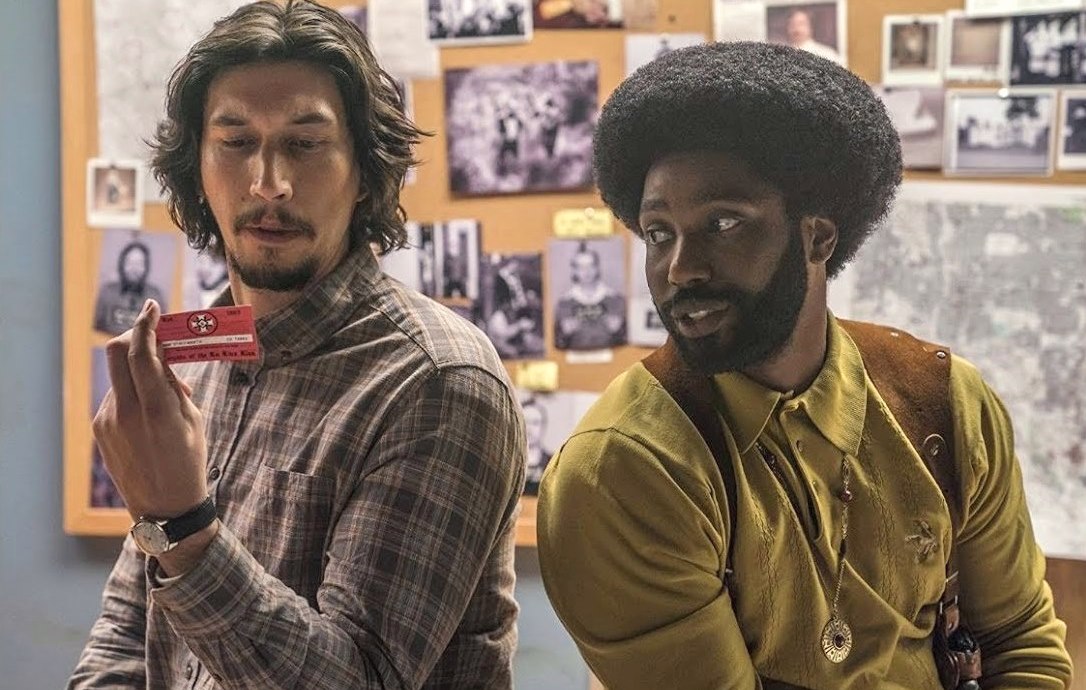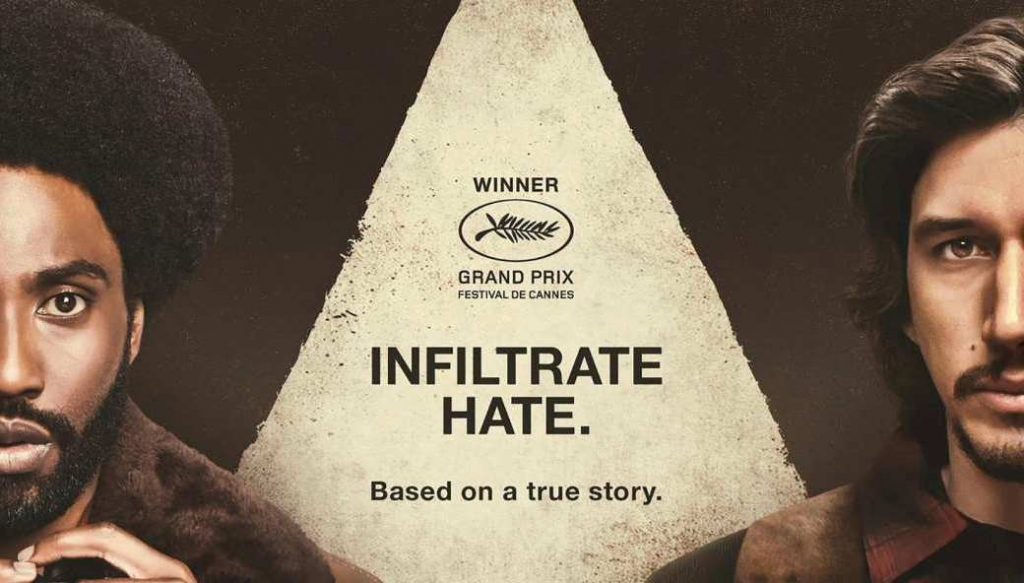
Spike Lee is spurred to make an important but little known historical movie about 1970’s police infiltration of the Ku Klux Klan in Colorado Springs and tying it to the actions and behaviors of the fateful Charlottesville, Virginia riots of August 2017. You can feel Lee’s year-long passion and drive to getting BlacKkKlansman made, and yet what a forceful, thought-provoking, funny, stirring, cop-wise, suspenseful experience he crafts. It’s based on the memoirs of Ron Stallworth, who was the first black cop in Colorado Springs, at first as a rookie working the slave-driving records department before pushing his way forward to become an undercover detective.
The actor playing Stallworth as a cop with a soul brother sheen is John David Washington, whom I do not recall in any other movie. But what can I say? He’s a star. And he works incredibly well with fellow Adam Driver, who plays a Jewish cop named Flip Zimmerman who will infiltrate the KKK, and Driver himself is probably the most natural method actor working in the movies today. Lee has always elicited great work from his headliners, so that’s no surprise.
What’s the surprise is that Lee has never made a film with such an incredible output by an entire large ensemble before. Lee gets you inside the thought process and messy manners of the Ku Klux Klan, the Black Panthers, the divided police force (we also see, as if it’s really first-hand, where the KKK truly derives from). Ryan Eggold, Jasper Paakkonen, Ashlie Atkinson, Paul Walter Hauser, Corey Hawkins, Laura Harrier, Harry Belafonte, Michael Buscemi, Ken Garito, Robert John Burke, Alec Baldwin and Topher Grace as David Duke – some names familiar, some not – all make up a perfect cast.
It’s exciting to see a black man in that period be in control, and to see [mostly] everybody else excitedly working behind him on this. Stallworth gets Flip to share the Ron Stallworth identity while working on the case. Stallworth handles the phone calls, and eventually gets connected on the phone with the Grand Wizard of the KKK, David Duke, and after some buttering up, they become “friends.” All the while Flip submits to membership with the KKK, but his Jewishness comes into question and he has to hide it. The movie makes it clear that Jews were to blame for black civil rights in America, and for that, Flip could get ejected. Hate towards Blacks. Hate towards Jews. The KKK members also make a number of other befuddling, inconsistent claims in their ideologies.
The movie builds to a historical little known event where the cops must interrupt a race war collision between the KKK and the Black Panthers. The KKK members throughout the film are disorganized hayseeds, unhappy and reactionary, inebriated and unfocused – yet itching to make some kind of big stand by committing a statement of violence against someone prominent from the Black Panthers. What are the Black Panthers about? See for yourself, but to me they’re just a black empowerment group to help individuals get through school, find a job, find a place in society where they fit in… and perhaps they say a few angry things they shouldn’t say about the violent pig police force. Merited, sure. But if taken out of context? The wrong people could get hurt.
In the early 1990’s, the works of Oliver Stone and Spike Lee burned brighter than any other filmmakers in that period. As time wore on, their stars tarnished for very complicated reasons – they would always have their followers, but each subsequent film became less of a must-see event. “BlacKkKlansman” has a great story to tell, but it’s important, and tickling, to see how Grand Wizard and presidential hopeful (!) David Duke was duped by a black man who he thought was white.
Tying Colorado Springs KKK violence in this era is a conclusion with assembled documentary footage of the Charlottesville riots, with David Duke of today present, and Donald Trump using permissive alt-right language to aggravate the events. It’s inevitable that alt-right Republicans-with-IQs>45 will think it’s fake footage that’s doctored Hollywood magic (in 1992, a few months after the release of “JFK” Oliver Stone was placed in a hearing in front of white-haired, stodgy 65-and-over Republicans who drilled him that John F. Kennedy’s death on-screen must have been all special effects and brewed up by Stone’s druggy visual trickery). No, it’s the fuk’ real, that’s really Heather Heyer getting run over and several others getting smashed by a car, too, in Lee’s assembled footage. In fact, if there’s anything wrong with Liberal Media it is that its too polite and we have to depend on guys like Lee showing long, uninterrupted footage to show us the full truth, and show us the malignant White House response in conjunction with it.
“BlacKkKlansman” is Lee’s most relevant movie in twenty-five years. This was the Grand Prix winner at this year’s Cannes Film Festival, essentially it’s second place. I have yet to see the Palm d’Or winner “Shoplifters” but I admire its Japanese director Hirokazu Kore-eda. My gut instinct though is that Lee’s film should have taken top prize.
135 Minutes. Rated R.
HISTORICAL DRAMA / THINKING TEENS / MASTERPIECE
Film Cousins: “Malcolm X” (1992); “4 Little Girls” (1997); “Oklahoma City” (2017); “Detroit” (2017).





